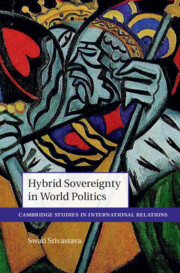Book contents
- Hybrid Sovereignty in World Politics
- Cambridge Studies in International Relations: 161
- Hybrid Sovereignty in World Politics
- Copyright page
- Dedication
- Contents
- Figures
- Tables
- Acknowledgments
- Introduction
- 1 Hybrid Sovereignty in International Theory
- 2 Ideal-Types of Public/Private Hybridity
- 3 Hybrid Sovereign Empire in the English East India Company
- 4 Contracting American Wars through Blackwater
- 5 Institutionalizing Markets through the International Chamber of Commerce
- 6 Shadowing for Human Rights through Amnesty International
- 7 Conclusions on Power and Responsibility in Hybrid Sovereignty
- References
- Index
- Cambridge Studies in International Relations
6 - Shadowing for Human Rights through Amnesty International
Published online by Cambridge University Press: 01 September 2022
- Hybrid Sovereignty in World Politics
- Cambridge Studies in International Relations: 161
- Hybrid Sovereignty in World Politics
- Copyright page
- Dedication
- Contents
- Figures
- Tables
- Acknowledgments
- Introduction
- 1 Hybrid Sovereignty in International Theory
- 2 Ideal-Types of Public/Private Hybridity
- 3 Hybrid Sovereign Empire in the English East India Company
- 4 Contracting American Wars through Blackwater
- 5 Institutionalizing Markets through the International Chamber of Commerce
- 6 Shadowing for Human Rights through Amnesty International
- 7 Conclusions on Power and Responsibility in Hybrid Sovereignty
- References
- Index
- Cambridge Studies in International Relations
Summary
This chapter argues that Amnesty International’s chief sovereign accomplishment in Lived Sovereignty is organizing a global human rights polity from disparate transnational publics. However, shadow relations between Amnesty and governments related to funding, country access, and negotiating reforms in its first two decades threatened to derail the moral purity that undergirds the protection of human rights in Idealized Sovereignty. Successfully navigating shadow hybridity has thus been a central yet understudied feature of Amnesty. The historical analysis contextualizes the difficult choices Amnesty made to become the world’s leading INGO. Amnesty thus helps us see that hybrid relations endure even when the stakes are very high, exemplifying the pervasiveness of hybrid sovereignty in global politics.
Keywords
- Type
- Chapter
- Information
- Hybrid Sovereignty in World Politics , pp. 185 - 228Publisher: Cambridge University PressPrint publication year: 2022

